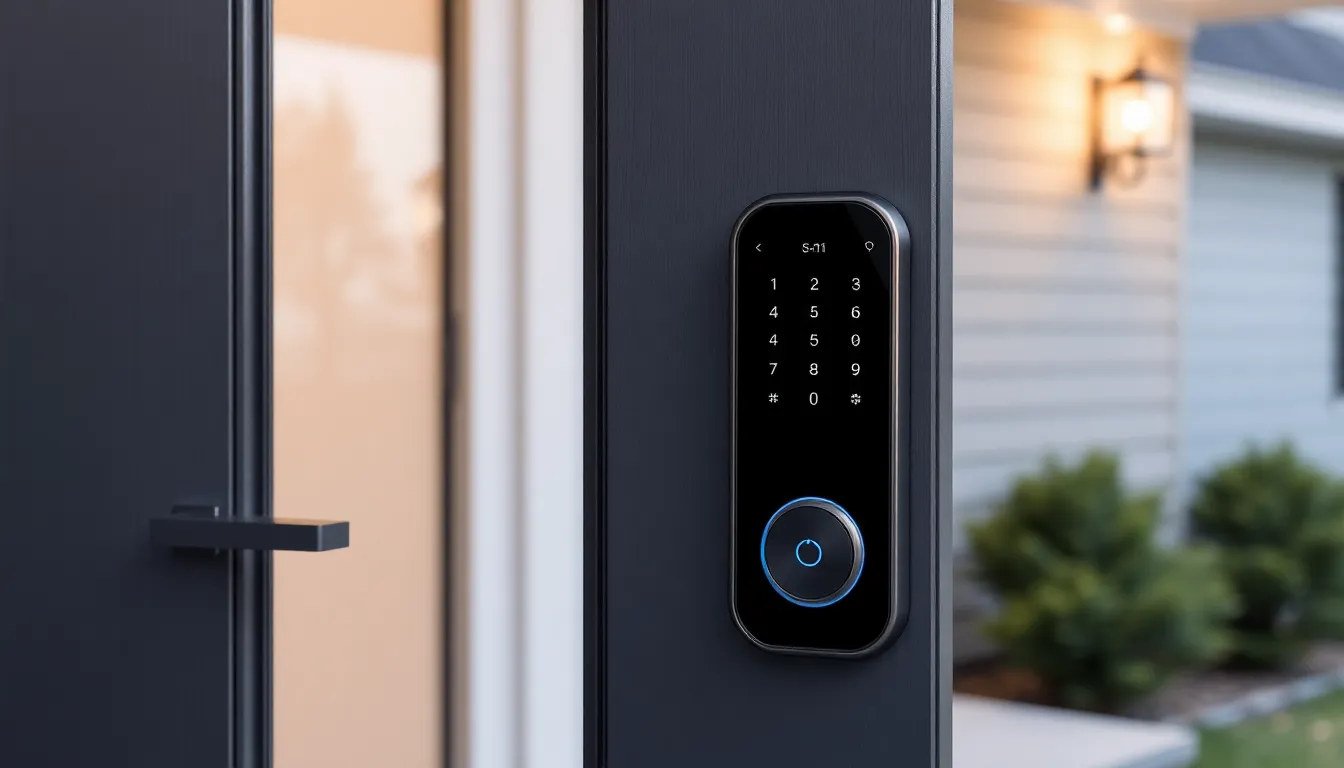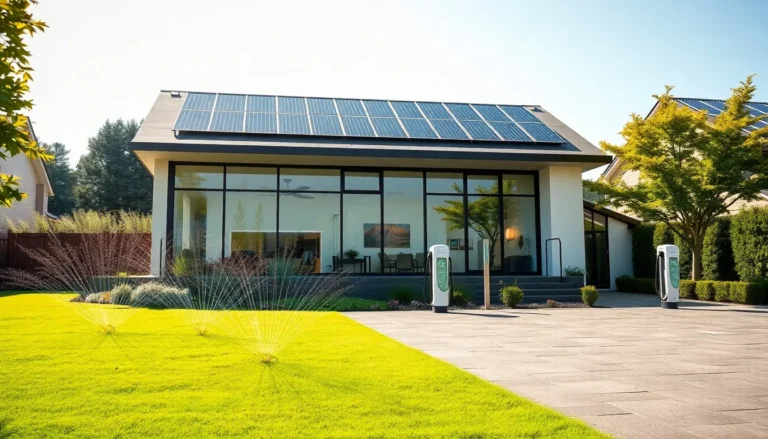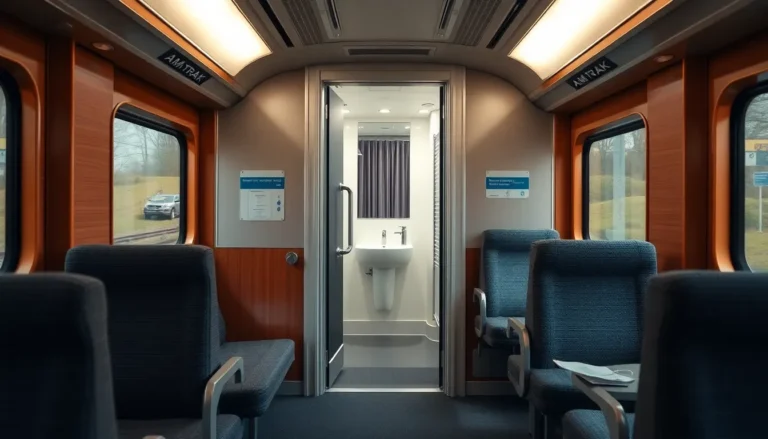In a world where losing keys feels like a rite of passage, smart locks have swooped in like superheroes, ready to save the day. Imagine never having to search for that elusive key again or worrying about whether you locked the door behind you. With smart locks, home security gets a tech-savvy upgrade that even your grandma can appreciate—if she can figure out how to turn on her smartphone.
These nifty gadgets not only keep unwanted visitors at bay, but they also add a sprinkle of convenience to everyday life. Whether it’s letting in a friend while you’re still in your pajamas or tracking who’s coming and going, smart locks are here to revolutionize how we think about security. So, why stick with traditional locks when you can embrace the future with a touch of humor and a whole lot of peace of mind?
Table of Contents
ToggleOverview Of Smart Locks
Smart locks represent an innovative advancement in home security, designed to address common issues like lost keys. These devices enhance convenience while increasing overall security.
What Are Smart Locks?
Smart locks replace traditional locks with electronic locking systems that usually connect to smartphones or smart home hubs. They operate via Wi-Fi, Bluetooth, or Z-Wave, providing remote control for users. Entry can occur through various methods, such as mobile apps, codes, or even biometrics, allowing for versatile access options. Smart locks aim to simplify the locking and unlocking process, ensuring users experience both security and ease.
Key Features Of Smart Locks
Smart locks come equipped with several key features that enhance usability and security. Remote access enables control from anywhere, allowing users to grant entry without being physically present. User management tools support creating, deleting, and modifying access codes, catering to multiple users. Activity logs track entry and exit times, providing insights into who accessed the property. Compatibility with smart home systems adds another layer of convenience, allowing integration with other devices like cameras and alarms.
Types Of Smart Locks

Smart locks come in various types, catering to different user preferences. Each option offers unique features that enhance convenience and security.
Keyless Entry Smart Locks
Keyless entry smart locks eliminate the need for traditional keys. Users access their homes through mobile apps, access codes, or biometrics. These locks are ideal for those who value convenience and security. Many keyless systems include features like temporary access codes for guests. Certain models even offer voice control compatibility with smart home systems. Enhanced security features include activity logs to track who enters and exits the home. Such convenience appeals to tech-savvy users and those seeking ease in everyday access.
Smart Lock Deadbolts
Smart lock deadbolts combine traditional deadbolt security with modern technology. They provide robust protection while allowing remote locking and unlocking. Typically, users control them via smartphones, enabling real-time user management. These deadbolts often include biometric options, allowing access through fingerprints. Many models integrate seamlessly with existing smart home systems for enhanced functionality. Users benefit from automatic locking features, ensuring doors remain secured. The combination of enhanced security and smart technology makes smart deadbolts a popular choice for modern homeowners.
Advantages Of Smart Locks
Smart locks offer significant benefits that enhance home security and improve user convenience. Below are key advantages of these innovative devices.
Enhanced Security
Smart locks use advanced technology to bolster security. They provide options like keyless entry and biometric authentication, allowing secure access to a property. Real-time alerts notify users about any unauthorized attempts at entry, increasing peace of mind. Activity logs track who accesses the home and when, adding further control over who enters. These features make smart locks a valuable upgrade from traditional locking systems, ensuring robust protection against potential intruders.
Convenience And Accessibility
Smart locks prioritize convenience for users. They allow homeowners to grant access remotely, making it easy to let in guests or service personnel without needing to be present. Using smartphone apps, individuals can control their locks with just a tap, eliminating the hassle of carrying keys. Temporary access codes simplify sharing entry privileges with friends or family, and many locks offer compatibility with voice-controlled devices. This seamless integration with smart home ecosystems enhances overall accessibility and usability.
Considerations When Choosing Smart Locks
Selecting the right smart lock requires careful consideration of several factors. Understanding these aspects ensures that the lock chosen meets specific needs effectively.
Compatibility With Existing Systems
Compatibility plays a crucial role in the selection process. Smart locks must integrate seamlessly with existing home security systems and smart devices. Users should check if the smart lock supports platforms such as Amazon Alexa, Google Assistant, or Apple HomeKit. Ensuring that the lock works with Wi-Fi, Bluetooth, or Z-Wave technology is essential for efficient management. Choosing a lock that easily interacts with current setups enhances overall usability and functionality.
Battery Life And Maintenance
Battery life significantly impacts the reliability of smart locks. Most smart locks use batteries, with a typical lifespan ranging from six months to two years. Regularly checking battery levels prevents unexpected lockouts. Users can also opt for locks that include low-battery alerts to prompt timely replacements. Maintenance should involve routine cleaning and firmware updates, ensuring optimal performance and security features remain current. Selecting models known for battery efficiency and straightforward maintenance can lead to long-lasting security solutions.
Security Concerns And Vulnerabilities
Smart locks introduce unique security risks despite their benefits. Understanding these vulnerabilities is crucial for effective home security.
Common Threats To Smart Locks
Wi-Fi hacking poses a significant concern as attackers exploit weak passwords or unsecured networks. Bluetooth vulnerabilities also expose smart locks to risks if communication is not properly encrypted. Physical tampering can occur, with intruders attempting to bypass the lock’s electronic system. Unauthorized access happens occasionally through social engineering tactics aimed at tricking users into sharing their credentials. Lastly, vulnerabilities in software can lead to exploitation, making regular updates essential for maintaining security.
How To Secure Your Smart Lock
Utilizing robust passwords strengthens protection against unauthorized access. Enabling two-factor authentication adds an extra security layer, providing additional verification steps. Regularly updating lock software prevents exploitation of known vulnerabilities and optimizes performance. Choosing smart locks that come with encrypted communication minimizes the risk of interception. Owners should monitor activity logs frequently to detect any suspicious behavior. Installing the lock in a location that minimizes physical tampering increases its overall security.
Smart locks represent a significant advancement in home security technology. They offer unparalleled convenience and control for homeowners looking to enhance their safety. With features like remote access and user management tools, these devices cater to a variety of needs, making home entry easier and more secure.
As technology continues to evolve, smart locks will likely become an essential part of modern living. Their integration with smart home ecosystems adds to their appeal, ensuring that users can enjoy both security and convenience. Embracing smart locks can lead to a more secure and streamlined home experience, paving the way for a smarter future.


